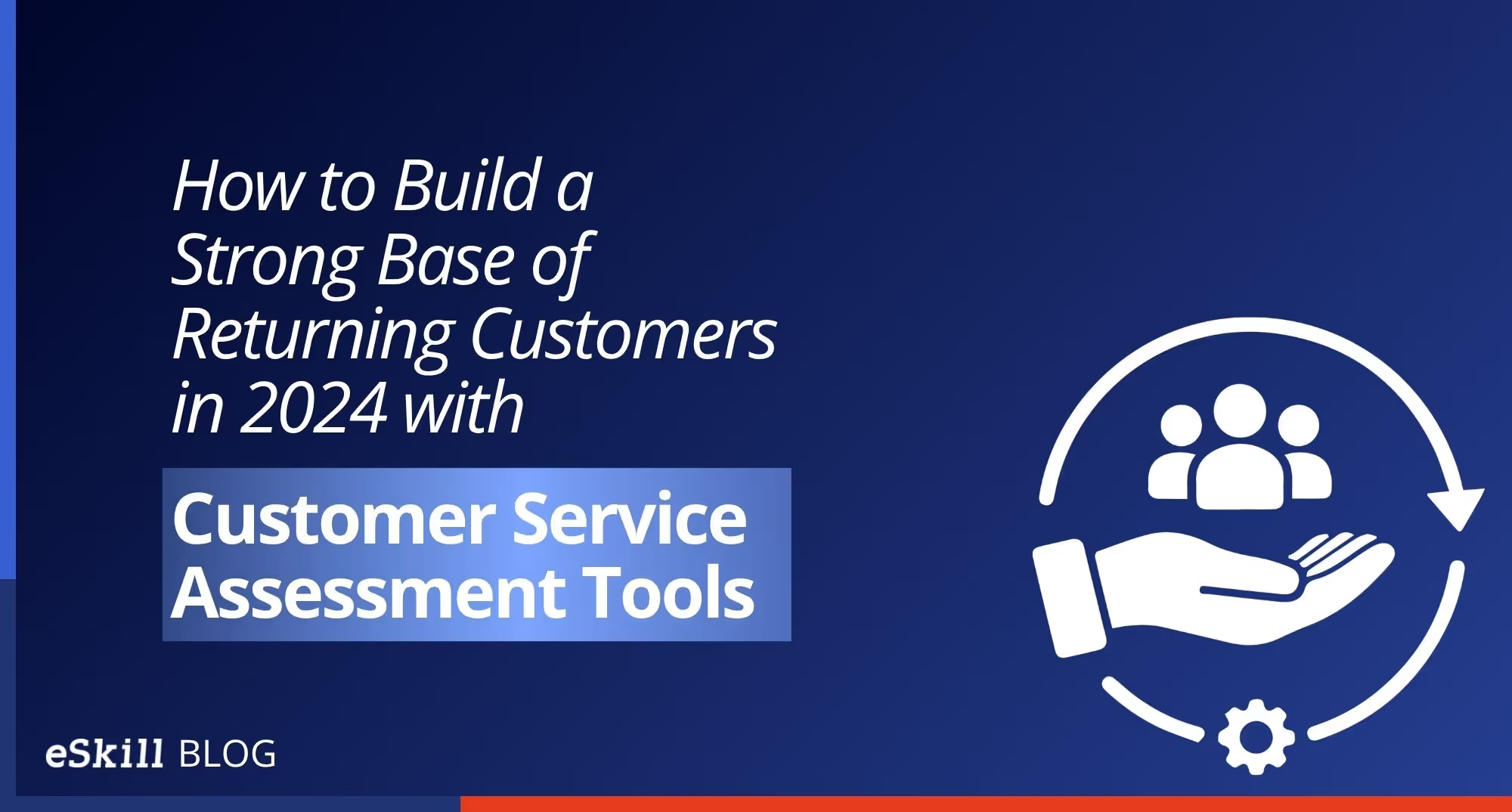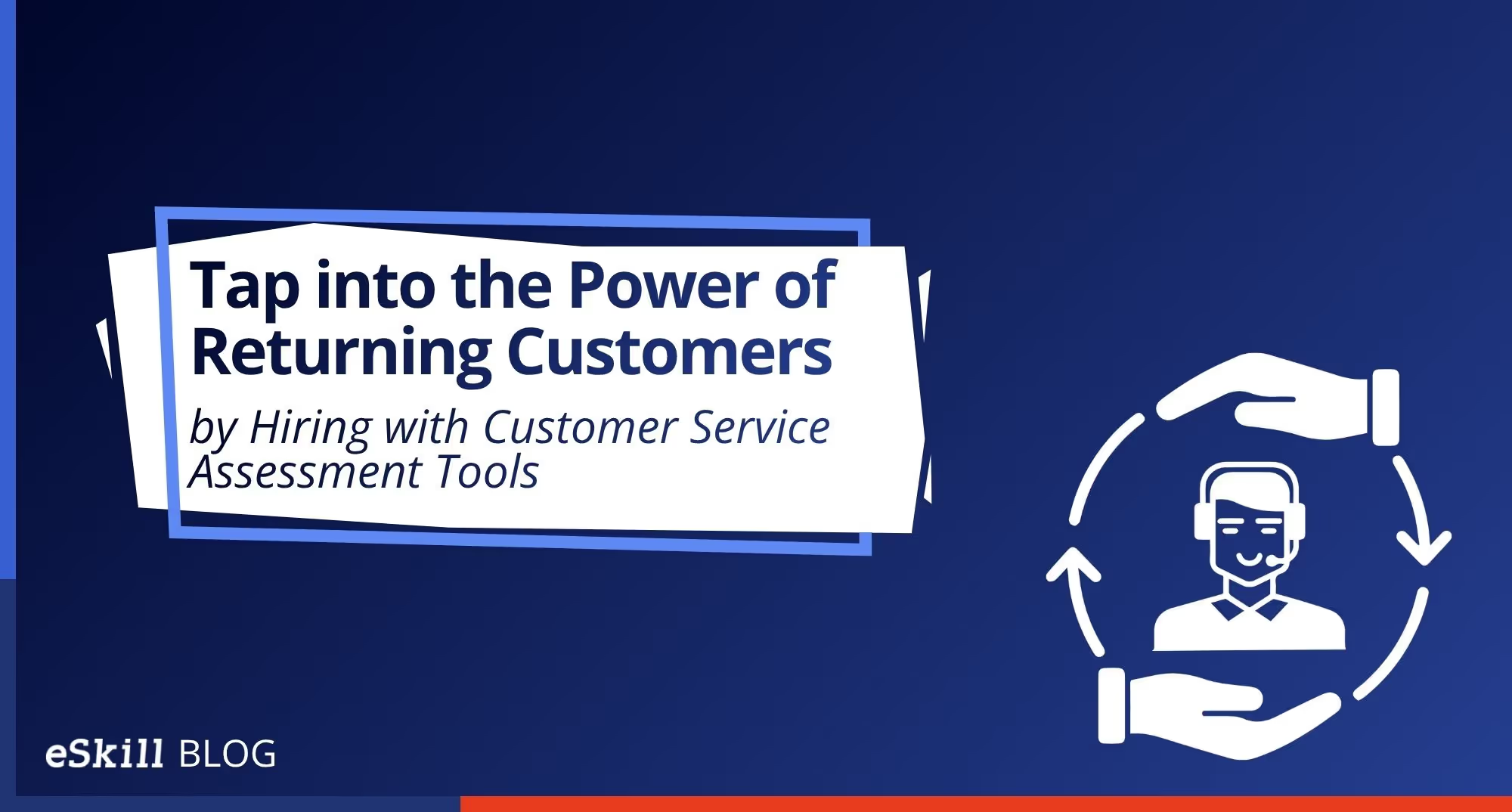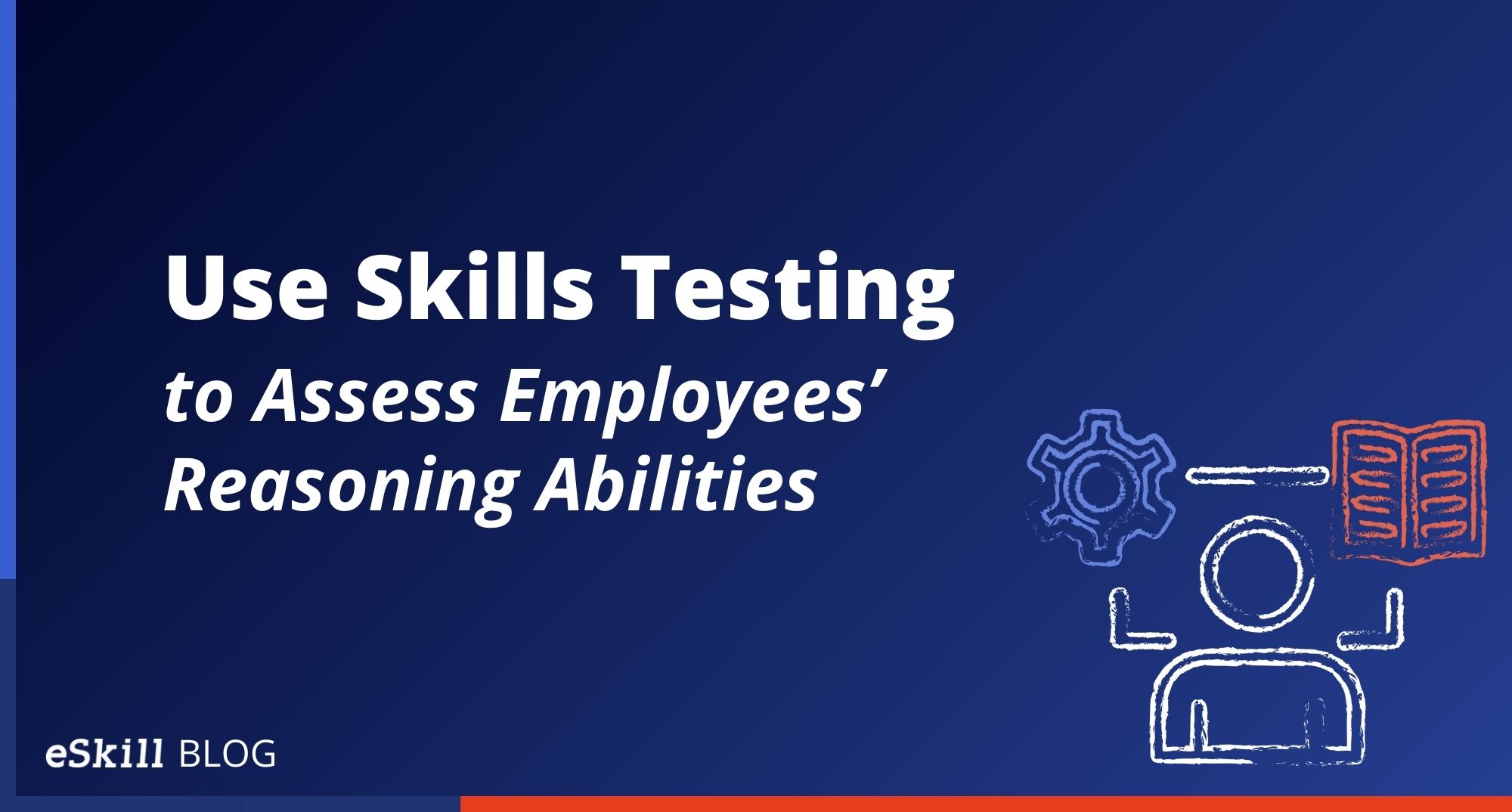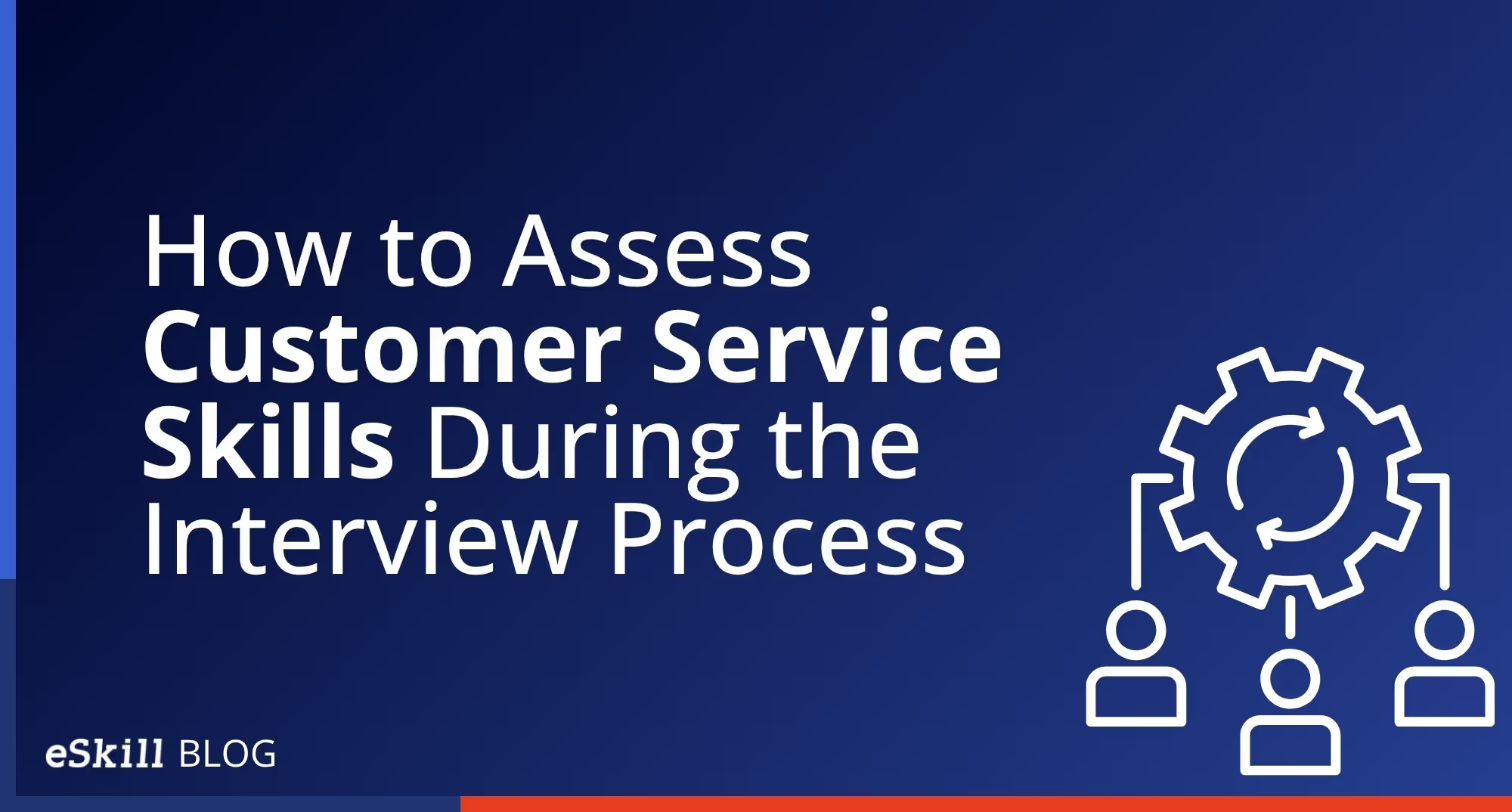Do you underestimate the importance of customer service? If so, you are making a big mistake because the quality of the service you offer can affect your bottom line. An astounding 93% of customers will go out of their way to do business with companies that deliver superior customer service, and 58% say they would be willing to pay more for excellent service.
According to a Zendesk survey, 61% of your customers will take their business elsewhere if they have a bad service experience. A study conducted by Microsoft shows service is the deciding factor for 90% of customers when they consider doing business with your organization.
Companies worldwide know that quality of service is important to customers. So, they implement an industry-leading assessment solution like the eSkill Talent Assessment PlatformTM and use customer service assessments to identify top candidates for service-related jobs.
The Importance of Customer Service
Customer service representatives are the face of your company and brand and your key to building a loyal customer base. When clients and prospects contact your company, a customer service representative is likely the first person they interact with. For many, it is the ONLY person they talk to.
Your ability to retain customers affects the health of your company. Keeping an existing customer costs about one-fifth as much as acquiring a new one, and you can increase profits by up to 25% by increasing customer retention by just 5%. This is because you invest less revenue and fewer resources in customer acquisition.
High attrition rates stifle growth and hurt your bottom line, and your business flourishes when you retain customers. Your success rate while attempting to sell a product or service to an existing customer is around 60% to 70%. However, there is only a 5% and 20% chance that you will close a deal and convert a prospect into a new customer. So, if you rely too heavily on new customer acquisition, you will always be playing catch-up.
The Current State of Customer Service
Service delivery is still not meeting customers’ expectations, even though businesses have increased their investment in customer service. A Netomi Pulse Report shows over 50% of consumers have not noticed any improvement, and 23% say customer service has gotten worse.
A large part of the problem is that recruiting good customer service representatives is difficult because they need to have many different skills. They must be excellent verbal and written communicators, be good at multitasking, manage their time efficiently, and know and understand their company’s products and services. They must also be accommodating and sympathetic and able to work with angry and difficult callers without getting rattled.
Another problem is HR teams can no longer use traditional hiring practices such as resumes and interviews to find top candidates. There is a good chance the information is inaccurate, as over 77% of applicants lie about their qualifications and experience.
In today’s hiring climate, applicants whose resumes look perfect and who sound great during interviews could end up being a big hiring mistake because they lack the required skills and experience for a job. Customer service assessment tools reduce the chance of this happening because they show which candidates are top contenders and allow HR teams to eliminate unqualified applicants.
What is a Customer Service Assessment Test?
Customer service assessment tools help business and HR leaders identify and hire top applicants by showing which applicants have the skills required for a job. Unlike screening hundreds or even thousands of candidates, they instantly show which applicants are qualified and which ones should be eliminated from consideration.
Once applicants complete and submit their customer service assessments, HR teams can sort them by score and review cumulative scores and section-specific data. This gives them the information to create a shortlist of candidates who can deliver the quality of service customers deserve.
Utilizing customer service assessment tools reduces the risk of hiring mistakes, which are a business’s worst nightmare because they kill productivity and harm staff morale. They are also expensive. The cost of a bad hire ranges from 30% of the employee’s first-year earnings when you include recruiting expenses, staff disruption, loss of customer goodwill, and potential litigation.
Customer service assessments minimize the chance that hiring mistakes will occur because HR professionals use hard data to make decisions rather than rely on gut feel. They also help businesses maintain compliance with fair hiring practices and standards, minimizing the chance that subjective bias will influence hiring decisions.
How to Choose a Customer Service Assessment Test
The best way to test customer skills is to use a customer service assessment tool that allows you to create tests that assess applicants’ ability to complete tasks they will perform on the job, such as the eSkill Talent Assessment PlatformTM.
For example, if the primary focus of a job is inputting and processing orders, you need a detail-oriented person with accurate typing skills. So, your customer service assessment could include questions from the eSkill Attention to Detail and Form-Fill Data Entry Typing assessments and questions from the Customer Service skills test.
If the new hire will handle customer inquiries and solve order and delivery problems, they need to be an excellent listener with good problem-solving skills who can work effectively with all types of customers. So, in this case, you should create a customer service assessment that measures listening, empathy, and problem-solving abilities and include questions from the eSkill Emotional Intelligence skills test.
The types of questions you include are also important. Customer service assessments may consist of questions in multiple-choice, simple select, select all that apply, and true/false formats. If the job requires extensive phone contact with customers, you should ensure that applicants are good communicators and have good phone etiquette. If the job requires foreign language proficiency, you should include video response questions where applicants record and upload their responses so you and your team can review and evaluate their answers.
What are Good Customer Service Questions for Hiring?
HR professionals often ask what is on a customer service assessment. There is no definite answer because it depends on what the new employee will do and the organization’s goals and objectives. However, we stress the importance of selecting a customer service assessment tool that allows them to customize skills tests.
The eSkill Talent Assessment PlatformTM lets HR leaders and hiring managers choose pre-prepared customer service assessments and add and delete questions or create customized skills tests by selecting questions from multiple assessments. They can also add their own questions. For example, if a hiring team was recruiting customer service representatives with strong MS Word and Excel proficiency and good basic math skills, they could use questions from the Customer Service Skills Test and add questions from the MS Word®, MS Excel®, and Basic Math skills tests.
As many hiring managers can attest, the best way to confirm applicants can do a job is to ask them to complete tasks they would perform if hired. This is why customer service assessment tools offer the option to include simulations in customer service assessments. The eSkill Talent Assessment PlatformTM has a Chat simulation that helps you confirm candidates can communicate with customers using popular applications. It also has a Multitasking simulation to ensure applicants can manage multiple tasks simultaneously.
10 Customer Service Skills to Test For
HR professionals often ask us which skills they should test to hire top customer service representatives. They ask us to “boil it down” by asking questions such as, “What are the seven qualities of good customer service?” or “What are the 5 most important skills in customer service to test for?” The answers depend on the nature of the job and the company’s goals and objectives. However, we recommend they look for these attributes when recruiting candidates for service-related jobs.
Empathy: Applicants need to be able to understand peoples’ feelings and why they react the way they do in specific situations. If a customer has a problem, displaying empathy shows the candidate understands why the customer is upset and expresses concern to demonstrate that the company and its employees want to resolve the problem.
Problem-Solving: Candidates with good problem-solving skills can pinpoint and define problems, understand the underlying cause, find a solution, and take action toward resolution.
Communication skills: Candidates who are good communicators can convey messages effectively both verbally and in writing, which is important in customer service roles because unclear communication can cause misunderstandings and confusion, leading to incorrect orders and lost business.
Active Listening: Active listening is an important attribute for customer service representatives because it is easier to help clients if you take the time to listen to them and completely understand where they need help.
Patience: Patience is an important trait for customer service representatives because they are often forced to deal with dissatisfied customers. People who are patient are good at resolving complex situations without expressing frustration, anger, or other negative emotions. They remain calm and collected and show customers they want to help, even if the caller is angry.
Positive Attitude: Candidates with a positive attitude can look at situations favorably and optimistically. This is an important attribute because it shows professionalism and increases customer satisfaction. A positive attitude also gives customers a good impression of your business, translating into better customer retention and more referrals.
Emotional Intelligence: A great customer service representative can relate to all types of people but is especially good at managing frustrated customers. They intuitively understand the other person’s point of view and know how to empathize with them instead of taking things personally.
Resourcefulness: A good customer service representative is an excellent problem solver. A great one takes the initiative by infusing warmth and personality into a typical customer service exchange and inspires customers to tell their friends. It is not something you can teach. Candidates either have this ability naturally, or they do not.
Technical Knowledge: Customer service representatives often talk to customers and prospects who are considering purchasing one or more of their company’s products and services. So, they should be able to speak knowledgeably about their company’s offerings and explain how prospects can benefit by purchasing specific products and services.
Adaptability: Customer service representatives need to be able to think on their feet because they often get thrown curve balls. Clients make requests that are not covered in your corporate policy or during training. So, customer service reps need to be prepared to handle unusual requests.
Customer Service Job Assessment Examples
These are examples of customer service assessment tests that are available in the eSkill Assessment Library.
- Customer Service: Includes questions that help you assess candidates’ listening and empathy skills and teamwork and collaboration abilities.
- Problem-Solving: Evaluates applicants’ ability to define problems, develop viable solutions, and work toward a resolution.
- Basic Computer Skills: If a customer service job requires good computer skills, this assessment helps you test candidates’ knowledge of MS Office® applications such as Word, Excel, and PowerPoint.
- Emotional Intelligence: Evaluates applicants’ social intelligence and empathy and is used to assess candidates for jobs requiring a lot of customer interaction.
- Email Etiquette: Confirms applicants understand email etiquette and can format and write email messages using correct grammar and spelling.
Get Started with Customer Service Assessments
Building a strong support and service team can improve customer retention and profitability. When you provide clients with exceptional service, they are likely to become repeat customers and loyal advocates for your brand. This helps you maximize retention and reduce churn, which is significant because new customer acquisition costs six to seven times more than retaining existing clients.
You can improve the quality of the customer service you provide by hiring better-qualified candidates.
Customer service assessments help you recruit top candidates with a high likelihood of success in customer service representative roles at your company.
Do you want to learn how customer service assessments help you build a service dream team that encourages repeat business? Contact us to request a demo.
Talk to sales






